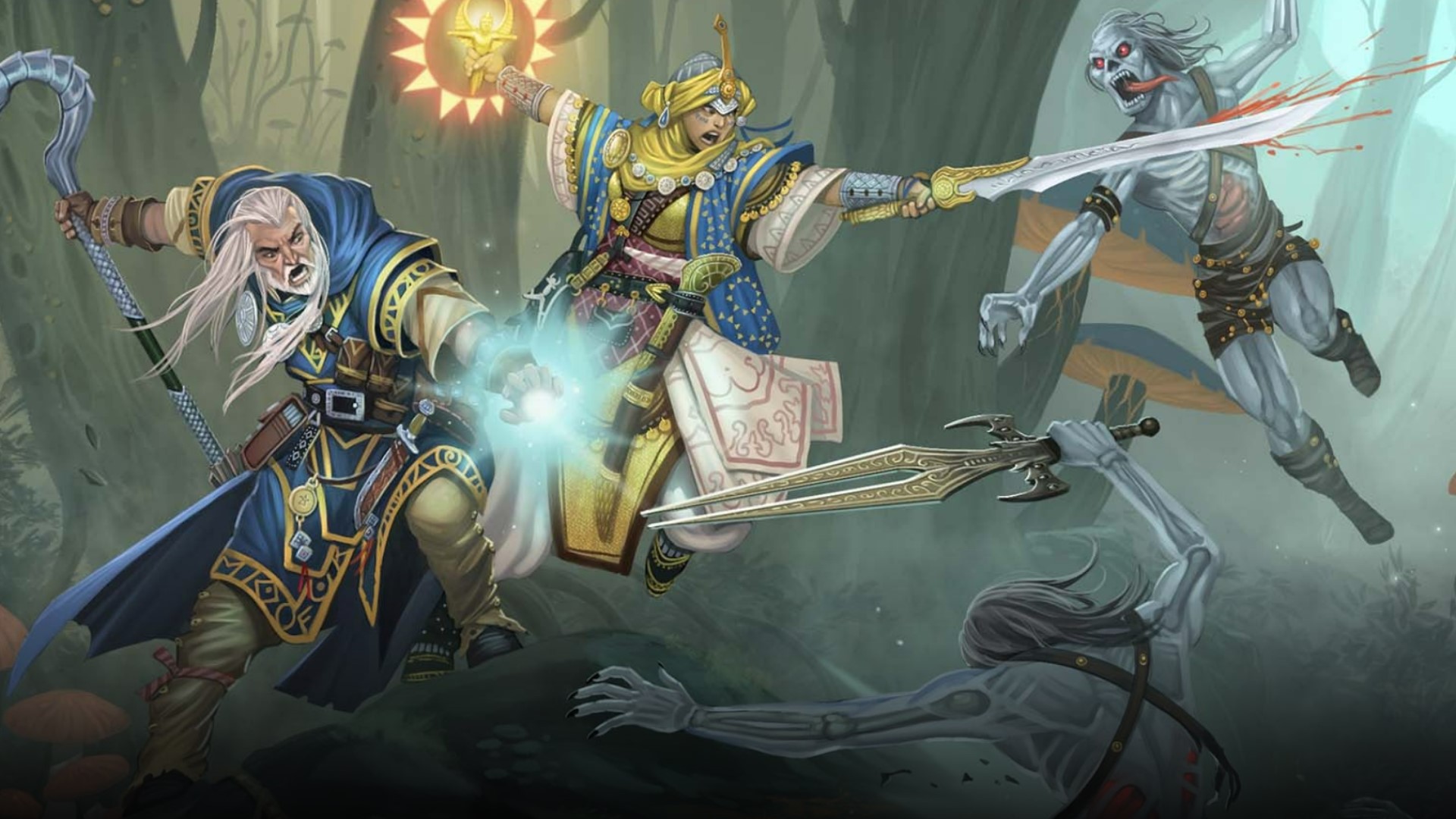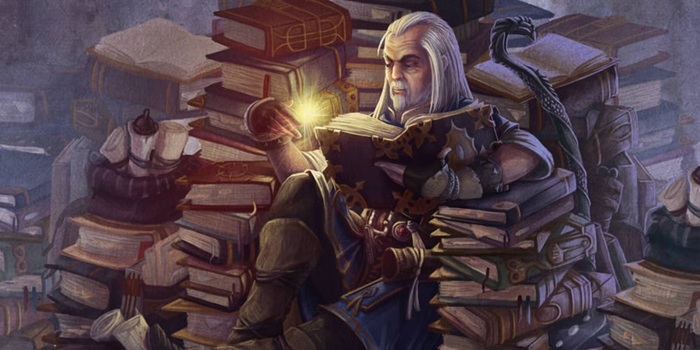Pathfinder Wizards are the adventurers who not only use magic, but spend countless hours studying the art and theory behind it.
The Pathfinder Wizard is the classic magic-centered, spell-casting class. They study and hone their magical craft, not only in their youth as students. But will go on to be eternal students and scholars of the universe’s many secrets. For the Wizard, magic is a science to be respected, practiced, and studied. And they will consider the vast theory of magic as much as they practice wielding it.
Jump to…
The Pathfinder Wizard Basics
Wizards are unsurprisingly a class that values Intelligence above all else. At character creation they get an immediate boost to the attribute. They also start with expert-level training in their Will saving throw. Additionally, they begin their adventure with training in Perception, Fortitude, Reflex, Arcana, simple weapons, unarmed attacks, and unarmored defense. Wizards will also take a number of additional skills equal to their intelligence modifier plus two.
In combat, the Wizard will most likely try to stay out of the thick of things. They would far prefer to keep a little distance between themselves and any weapons. Instead, Wizards prefer to carefully judge when to cast the perfect spell from outside of the danger zone. And when the enemy has their own perfect spell, the Wizard knows exactly what to counter with. For the Pathfinder Wizard, every problem can be solved with some thought and logic. That said, sometimes the correction solution is a well timed fireball.
Arcane Thesis
During their wizardly studies, they will produce a thesis of their magical research. Depending on the topic, the Wizard will gain special benefits of their specialized knowledge.
Experimental Spellshaping: In this thesis, your Wizard claims that spellshaping can be accomplished most effectively by altering the parameters as you cast, giving them the most efficient access to different spellshape effects. This thesis gives the Wizard an additional first-level spellshape wizard feat as well as the ability to have another prepared at 4th level.
Improved Familiar Attunement: Wizards who have written this thesis studied the fine-tuning of magical bonds between Wizards and their familiars. They have a stronger connection to their familiars than other Wizards may. They gain another familiar-wizard feat, and their familiar gains an extra ability at first, sixth, twelfth, and eighteenth levels.
Spell Blending: This arcane thesis claims that the concept of ‘spell slots’ is simply a shorthand for an underlying energy that all spellcasting is powered from. Through their study, they have found a way to reorder the hierarchy of spell slots to fuel even more powerful spells. These Wizards can trade two spell slots of the same rank for a spell slot up to 2 ranks higher. They can also trade any spell slot for two additional cantrips.
Spell Substitution: After perusing this arcane thesis, Wizards uncover shortcuts to preparing or substituting spells between the regular daily spell preperation. This allows them to spend ten minutes to empty one of their prepared spell slots and replace it with a different spell from their spell book.
Staff Nexus: This thesis helps Wizards learn that early and intense use of staves from the first days of study can create a strong bond between the spellcaster and the staff. They have such a strong connection with their staff that they can infuse it with power and give it magical traits of its own. While holding the staff, Wizards can cast the spell it contains.
Arcane School
Most Wizards learn magic from an institution. This will help inform their relationship with magic as well as which spells they already have in their spell book. Depending on which arcane school your Wizard has attended, they will have had access to a different curriculum as well as different school spells. School spells are heightened, focus spells and they are unique to the various school.
For example, School of Ars Grammatica is focused in runes, wards, logic, and magic’s fundamental forces. The curriculum here includes messge, sigil, command, disguise magic, runic body, runic weapon, dispel magic, translate, enthrall, veil of privacy, dispelling globe, suggestion, sending, truespeech, repulsion, spellwrack, contingency, planar seal, quandary, unrelenting obersation, and detonate magic with school spells protective wards and rune of observation.
The School of Civic Wizardry on the other hand, focuses on magic as a way to help the common person. The curriculum here includes prestidigitation, read aura, hydraulic push, pummeling rubble, summon construct, revealing light, water walk, cozy cabin, safe passage, creation, unfettered movement, control water, wall of stone, disintegrate, wall of force, planar palace, retrocognition, earthquake, pinpoint, and foresight with school spells earthworks and community restoration.
And then the School of Unified Magical Theory is more of a self-study school that uses a bit of everything. It has no set curriculum, but has school spells hand of the apprentice and interdisciplinary incantation.
Multiclassing a Pathfinder Wizard
For the adventurer who wants to study the arcane arts… But not enough to truly dedicate their life to the craft. Multiclassing as a Wizard would give them access to enough spells to get into trouble. Almost any class could benefit from the addition of a little magic to their usual repertoire.
Multiclassing as a Wizard gives players access to the feats Wizard Dedication, Arcane School Spell, Basic and advanced Arcana, Basic, Expert and Master Wizard Spellcasting, and Arcane Breadth.
How to Play a Pathfinder Wizard
There is a lot that you could be doing as a Wizard. And like many other classes, it can be easy to feel a little overwhelmed. It can be easy to fall into the habit of using your Wizard to blast everything in sight. But remember that controlling and altering the battlefield from afar can often be more useful. Walls, summons, and changing your foe’s visibility can save your party members from taking additional damage. Or, they can even help them land the perfect surprise blow.
Of course, there will be a time for that fireball.
Study Hard, Spell Hard
Like Wizards are a class focused on education, players will need to focus on preparation. You don’t want to waste your best spells where they’re not needed. But similarly, spending an entire encounter saving your spells for an imagined perfect moment is also not helpful. An experienced Wizard can find a way to prepare for almost any situation. But you may need to experiment with various spells prepared spells to see what’s most useful for your particular party.
Subscribe to our newsletter!
Get Tabletop, RPG & Pop Culture news delivered directly to your inbox.
Happy adventuring!
Don’t Miss:
Read more at this site






